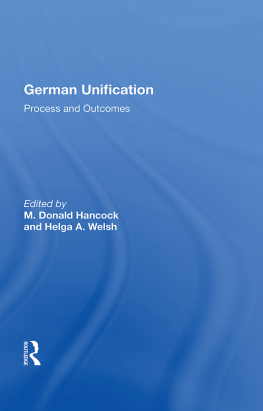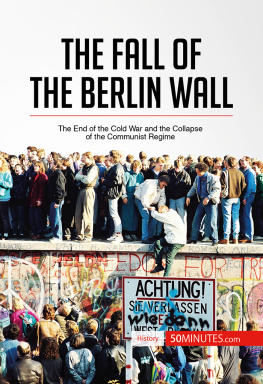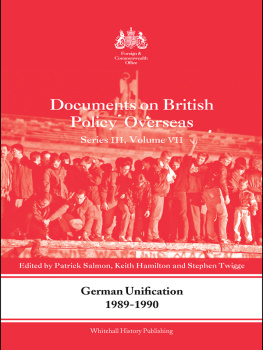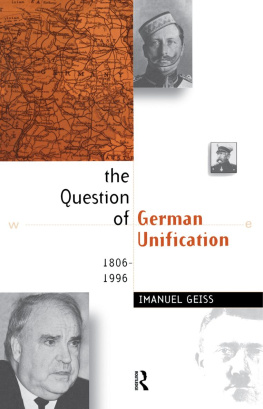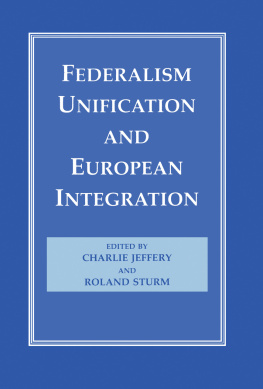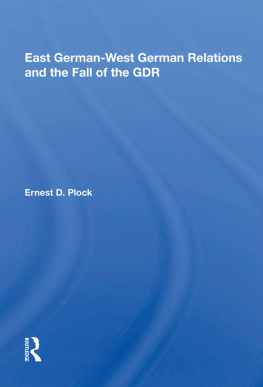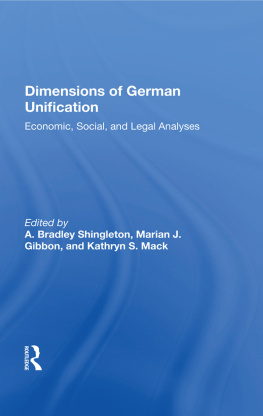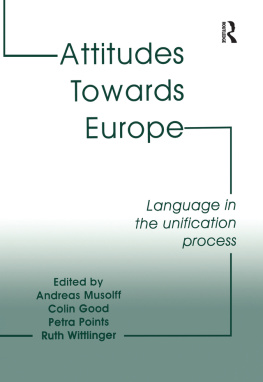German Unification
First published 1994 by Westview Press
Published 2018 by Routledge
52 Vanderbilt Avenue, New York, NY 10017
2 Park Square, Milton Park, Abingdon, Oxon OX14 4RN
Routledge is an imprint of the Taylor & Francis Group, an informa business
Copyright 1994 by Taylor & Francis
All rights reserved. No part of this book may be reprinted or reproduced or utilised in any form or by any electronic, mechanical, or other means, now known or hereafter invented, including photocopying and recording, or in any information storage or retrieval system, without permission in writing from the publishers.
Notice:
Product or corporate names may be trademarks or registered trademarks, and are used only for identification and explanation without intent to infringe.
Library of Congress Cataloging-in-Publication Data
German unification : process and outcomes / edited by M. Donald
Hancock and Helga A. Welsh.
p. cm.
Includes bibliographical references and index.
ISBN 0-8133-8125-8. ISBN 0-8133-1965-X (pbk.)
1. GermanyHistoryUnification, 1990. I. Hancock, M. Donald.
II. Welsh, Helga A.
DD290.25.G47 1994
943.0879dc20
92-6822
CIP
ISBN 13: 978-0-367-00906-9 (hbk)
To the memories of
Donald Schoonmaker
Rudolf Wildenmann
Valued friends and colleagues
Contents
, M. Donald Hancock and Helga A. Welsh
PART ONE
Background and Impetus
, Helga A. Welsh
Johannes L. Kuppe
PART TWO
Process and Outcomes
, Henry Krisch
, Michael G. Huelshoff and Arthur M. Hanhardt, Jr.
, Michaela W. Richter
, Gert-Joachim Glaener
, Andreas Falke
PART THREE
Consequences and Problematics
, Peter H. Merkl
, Gunnar Winkler
, M. Donald Hancock
, James Sperling
, Petra Bauer-Kaase
, Helga A. Welsh and M. Donald Hancock
Guide
This volume is an international collaborative effort based on personal and professional witness by American and German social scientists to German unification as both process and outcome. Their contributions are addressed to students of comparative politics, public and private officials, and all citizens who seek to understand the causes, course, and enormous political, economic, and social consequences of one of the decisive international events of the late twentieth century.
Throughout the volume, we have followed two linguistic conventions which are not necessarily shared by others. Accordingly, a few explanatory remarks seem in order. The first concerns the use of the plural form of Germany. William A. Safire, in an op-ed article in the New York Times Magazine published on 1 April 1990, persuasively advocates the use of the grammatical rule governing the plural of proper names in the case of German unification. Were talking about uniting the two Germanys , Safire observes. Although the plural of nouns ending in y after a consonant is ies, the plural of proper names overrides the rule to preserve the name itself: Mr. and Mrs. Murphy and their two daughters are the Murphys; if both girls are confusingly named Mary, theyre the Marys. Accordingly, we consistently used the plural Germanys, rather than Germantes, a clarification which we welcomed and adopted for this book.
In addition, we have preferred the term unification to reunification. Although we realize that reunification is commonly used by scholars and others, reunification would literally mean the reestablishment of a united Germany within the boundaries of 1937and therefore should be avoided. Former Chancellor Willy Brandt deserves the credit for sensitizing the German and international public to the historical meaning of reunification and its misapplication to contemporary events in Germany. Indeed, unified Germany in its present borders is a new territorial entity that has not previously existed; therefore, strictly speaking, any reference to German reunification is historically imprecise.
The German Information Center in New York generously provided English-language translations of Chancellor Helmut Kohls Ten-Point . The appendixes are slightly abridged versions of the original documents.
We gratefully acknowledge the institutional support and technical assistance of colleagues at the Center for European Studies at Vanderbilt University and the Department of Political Science at the University of Arizona, in particular Jan Thompson, Robert Francis, Stacy McMillen, Robert Wilson, and Suzan Mclntire. We are also grateful to Ian Wallace for translating the chapter by Gert-Joachim Glaener and Anita M. Mallinckrodt and Britta Luehr for providing English-language drafts of the chapters by Johannes L. Kuppe and Gunnar Winkler, respectively. The final responsibility for the translations rests with the editors.
A special note of appreciation is due Susan McEachem at Westview Press. Her patient encouragement has made this volume possible.
M. Donald Hancock (Vanderbilt University)
Helga A. Welsh (Wake Forest University)
M. Donald Hancock and
Helga A. Welsh
These simultaneous outcomes test two hitherto disparate bodies of theoretical literature in social science: integration theory and general concepts of democratization. Integration theory addresses underlying socio-economic and political factors encouraging the formation of new political communities. In the specific German case, it also explicates the range of alternative regime choices implicit in the events of 198990 which spelled the demise of the German Democratic Republic as well as the actual outcome that ensued. Democratization theory, meanwhile, emphasizes the necessary conditions for successful transitions to viable post-authoritarian regimes.
The historical record provides contradictory evidence concerning Germanys democratic prospect. The nations first attempt at constitutional democracythe proclamation of the Weimar Republic in November 1918ended ignominiously with the rise of the Third Reich fifteen years later. In contrast, the formation of the Federal Republic in 1949 yielded a stable and effective democratic regime that served as a veritable international model of successful political and economic performance. The new Germany of the expanded Federal Republic poses unprecedented political and economic challenges not only to the Germans themselves but also to social scientists who seek to explain the process of unification and assess its consequences.
Integration Theory Revisited
Classical integration theory, as it evolved from the 1930s through the late 1960s, primarily addresses the transformation of autonomous nation-states into new forms of trans- or supranational political authority characterized by a shared sense of community among relevant political actors (including governments, organized interest groups, and citizens). A minimum common denominator of various conceptions of integration, Charles Pentland succinctly summarizes, is a process whereby a group of people, organized initially in two or more independent nation-states, come to constitute a political whole which can in some sense be described as a community. While Pentland correctly observes that there is no consensual definition of community among international relations scholars, the concept minimally consists of a shared sense of national or regional identity and fundamental political values among elites and a majority of citizens. Subsumed under Pentlands broad definition of integration are four distinctive theoretical approaches to the integrative process: pluralism, federalism, functionalism, and neo-functionalism.

